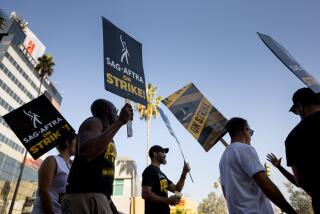Agents seek role in writers pact talks
As Hollywood braces for a possible strike next month, talent agents are trying to do what they know best: Match-make.
Several high-profile agents are quietly trying to broker a deal between studio executives and writers, who have been locked in rancorous contract talks that are set to resume Tuesday. The writers’ contract expires Oct. 31 and major studios are preparing for a walkout.
“We’ve reached out to them,” said one top agent, who asked not to be identified because of the sensitivity of the back-channel communications. “They should see us as a parallel resource.”
Karen Stuart, executive director of the Assn. of Talent Agents, a Los Angeles-based trade group that represents more than 100 talent agencies, said her organization was seeking to play a constructive role to help avert a strike while also preparing clients for that very prospect.
“Obviously we’re trying to do anything we can to facilitate a deal,” said Stuart, whose group hosted a meeting last month with leaders of the Writers Guild of America, West to discuss the state of contract negotiations and clarify strike rules, which the guild publicized last week in an apparent signal of its intent to strike if agreement on a new contract couldn’t be reached.
“Yes, a strike is a real possibility on Nov. 1 unless our employers present us with a reasonable offer,” guild President Patric M. Verrone said.
Nick Counter, president of the Alliance of Motion Picture and Television Producers, has accused guild leaders of acting irresponsibly in negotiations.
“The guild has raised a number of red herrings and irrelevant financial information,” Counter said after negotiations wrapped Thursday. “We believe they should focus on trying to reach an agreement with the production companies represented at the bargaining table.”
Amid the sparring, International Creative Management on Wednesday hosted a meeting with David Young, executive director of the guild, and Verrone at the talent agency’s Century City headquarters to discuss progress of the talks and the guild’s strike rules.
At the meeting, attended by more than 100 film and TV agents, ICM Chairman Jeff Berg suggested that guild leaders could use agents as a sounding board and resource in helping broker peace between writers and producers.
Verrone declined to discuss the meeting or any talks occurring with agents, but added: “We welcome the opportunity to meet with any of our clients’ representatives, to exchange information and answer questions.”
Talent agents have plenty of incentive to avert a walkout.
The bulk of agency income comes from the commissions agents earn on movie and TV deals as well as the “packaging fees” from TV shows they help put together.
A strike would cut through the heart of agencies’ revenue -- particularly for those agencies that are less diversified in their representation. In a prolonged strike, agencies would probably be forced to take drastic measures, including layoffs.
Most Hollywood talent agencies have contingency plans to cut their staffs in the event of a walkout. Even without the threat of a strike, agencies have been under steady pressure in recent years to increase revenue and cut expenses as studios make fewer movies in the face of spiraling marketing and production costs.
Some firms have asked employees to cut expenses by as much as 50% by flying coach, cutting back on weekly lunches at expensive stops such as the Grill on the Alley in Beverly Hills and even reducing donations to charitable events.
Meanwhile, writers are rushing to complete scripts by Oct. 31, a deadline several studios have imposed for submitting finished work. They’ve also been pressing their agents to clarify what they could or could not do during a strike in order to avoid crossing picket lines.
“We’re getting hundreds of e-mails and calls per day regarding the possible timing of a work stoppage and strike rules,” Stuart said.
The rules are considerably tougher than in the past. Among other things, they bar guild members from working on new animated features once a strike occurs -- even if they do so under another guild contract. Guild members also face fines and possible loss of their union membership if they write for the Internet and other new media, though studios contend the union lacks jurisdiction to enforce such a rule.
It’s not the first time agents have sought to defuse labor tensions.
In 1988, Creative Artists Agency co-founders Michael Ovitz and Bill Haber helped to lay the groundwork for a settlement during a strike that lasted 22 weeks. And in 2001, when the industry was facing back-to-back walkouts by writers and actors, the guilds enlisted the agencies to come to their aid. Both unions eventually negotiated agreements without going on strike.
Whether agents can have much of an effect this time around remains uncertain. The writers and the studios are much further apart than they were in 2001, mainly over pay for work distributed via the Internet and home video compensation.
Some agents acknowledge that even the late MCA/Universal chief Lew Wasserman, himself a legendary agent, would have been hard-pressed to broker peace between the warring parties because today’s media conglomerates are so huge and diversified and feel better prepared to withstand a strike.
What’s more, it’s unclear how willing current leaders are to give agents a peacekeeping role. Verrone and Young have vowed to take a tougher stance in negotiations than their predecessors and appear less inclined to solicit the help of agents.
Said one agent: “They haven’t invited us into the tent.”
--
lorenza.munoz@latimes.com
More to Read
The biggest entertainment stories
Get our big stories about Hollywood, film, television, music, arts, culture and more right in your inbox as soon as they publish.
You may occasionally receive promotional content from the Los Angeles Times.







